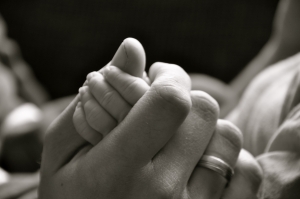Although four state governments in Australia have now apologised for forced adoption of the babies of single mothers in the 1950s, 60s and 70s, it is a little-known fact that the practice is an ongoing reality faced by thousands of Australians.
Parents with intellectual disabilities still face compulsory removal of their children, with many babies assumed into care at birth without consultation with mothers and families, grief counselling, or adequate post-birth care.
A group of campaigners - including researchers from the University of Sydney's Faculty of Health Sciences, the Parenting Research Centre and the Intellectual Disability Rights Service - has put recommendations to NSW's O'Farrell government regarding these adoptions. They hope that these recommendations will be implemented in order to avoid the need for more apologies in future.
Along with grief and loss counselling services for parents whose children are compulsorily removed, their recommendations include the development of removal protocols that focus on both the safety of children and the needs and feelings of birth parents.
"This is a critical issue in Australia and around the world. When babies are taken away from their mothers early on and the mother doesn't really understand why, then you have the potential for very distressed mothers, parents and families," says Professor Gwynnyth Llewellyn, Director of the Centre for Disability Research and Policy at the University of Sydney.
"It also appears that in parts of the country, including New South Wales, this is often taking place without the mothers knowing or given notice that it is going to happen, despite the legal requirements to the contrary," she says.
Often parents whose babies are removed are denied the chance to hold their babies, restricted from seeing them in special care nurseries, and given no opportunity to say goodbye to them when they leave the hospital.
"We also know that when children are taken into care they are likely to pursue a relationship with their birth parents. This is enormously traumatic for everyone involved, particularly for mothers and parents who never understood why their children were taken away," says Professor Llewellyn.
Mothers whose babies are removed are also often not given important post-natal support, including assistance to manage lactation or advice around post-birth recovery.
Without access to family planning counselling, they are also often unable to avoid further pregnancy - of the parents known to the Intellectual Disability Rights Service Parent's Project, 32 percent were pregnant within two years of having a baby or child placed under the care of the Minister.
While acknowledging some parents with intellectual disability do not have the capacity to care for children, the report urges that all parents, regardless of their childrearing capacity, should be treated with compassion and with regard to the immense trauma of losing a child.
"There is very little evidence anywhere in the world that parents with intellectual disabilities abuse their children," says Professor Llewellyn.
"More than that they are not understanding what's going on and not being given a chance to learn how to parent their children. We've shown in randomised controlled trials, as other researchers have, that parents with intellectual disabilities can learn to satisfactorily parent children."
The report also recommends the establishment of a supported accommodation facility for parents with intellectual disability to demonstrate and develop the confidence and competency to raise their children.
The University of Sydney has a long history of research and support for parents with intellectual disability, and jointly runs the Healthy Start initiative, a national capacity building strategy which aims to improve health and wellbeing outcomes for children whose parents have learning difficulties.
The University has also recently established its Centre for Disability Research and Policy, which is entirely focused on generating evidence and bringing it to the policy process to improve evidence-based strategies to support people with disabilities, their families and carers.
"The Healthy Start strategy is a great success story for Australia, and other countries including the Netherlands and Sweden have both introduced their own national strategies based on our model," says Professor Llewellyn.
"Our strategy is regarded as a world first, so in that sense Australia is ahead of the curve. However, if you ask whether we've really managed to provide adequate support and services for this group of people, sadly the answer is a categorical no," she says.
- Suppliers
- New to MedicalSearch? Book a Demo
- Advertise with us
- Login
- Email Marketing
- Buyers
- Get Quotes
- Articles & Ideas
- Login
- Subscribe to newsletter
- My Details
- Get Quotes
- Accident & Emergency Care
- Aged Care & Disability
- Anaesthesia & Respiratory Care
- Beauty & Wellness
- Cardiology & Cardiac Surgery
- Commercial Cleaning & Laundry Supplies
- Dental Care & Oral Surgery
- Diagnostic Instruments & Medical Imaging
- Disinfection & Sterilisation
- ENT & Audiology
- Gynaecology & Obstetrics
- Homecare & Consumer Medical
- Hospital Equipment & Supplies
- Intensive Care Unit
- Laboratory & Pathology
- Medical Apparel
- Medical Devices & Products
- Medical Fridges & Freezers
- Medical Storage & Filing
- Medical Waste Management
- Optometry & Ophthalmology
- Orthopaedics & Podiatry
- Paediatrics & Neonatology
- Patient Monitoring & Management
- Physiotherapy & Rehabilitation
- PPE & Infection Control
- Single Use Medical Consumables
- Surgical Tools & Supplies
- Treatment Beds, Tables & Couches
- Veterinary Equipment
- Wheelchairs & Mobility Aids
- Get Quotes
- Accident & Emergency Care
- Aged Care & Disability
- Anaesthesia & Respiratory Care
- Beauty & Wellness
- Cardiology & Cardiac Surgery
- Commercial Cleaning & Laundry Supplies
- Dental Care & Oral Surgery
- Diagnostic Instruments & Medical Imaging
- Disinfection & Sterilisation
- ENT & Audiology
- Gynaecology & Obstetrics
- Homecare & Consumer Medical
- Hospital Equipment & Supplies
- Intensive Care Unit
- Laboratory & Pathology
- Medical Apparel
- Medical Devices & Products
- Medical Fridges & Freezers
- Medical Storage & Filing
- Medical Waste Management
- Optometry & Ophthalmology
- Orthopaedics & Podiatry
- Paediatrics & Neonatology
- Patient Monitoring & Management
- Physiotherapy & Rehabilitation
- PPE & Infection Control
- Single Use Medical Consumables
- Surgical Tools & Supplies
- Treatment Beds, Tables & Couches
- Veterinary Equipment
- Wheelchairs & Mobility Aids
Trusted by 740,000 Australian medical buyers
Buyers
- Discover products & solutions
- Login
- Subscribe To Newsletter
- Browse All Products
- Read Articles
Suppliers
Advertise
- Promote your products & solutions
- New to MedicalSearch? Book a Demo
- Login / Forgot Password
- Advertise Your Products
- Success Stories
- Email Marketing
- Suppliers
- Advertise with us
- Login
- Email Marketing
- Buyers
- Get Quotes
- Articles & Ideas
- Login
- Subscribe to newsletter
- My Details
Get Quotes
- Accident & Emergency Care
- Aged Care & Disability
- Anaesthesia & Respiratory Care
- Beauty & Wellness
- Cardiology & Cardiac Surgery
- Commercial Cleaning & Laundry Supplies
- Dental Care & Oral Surgery
- Diagnostic Instruments & Medical Imaging
- Disinfection & Sterilisation
- ENT & Audiology
- Gynaecology & Obstetrics
- Homecare & Consumer Medical
- Hospital Equipment & Supplies
- Intensive Care Unit
- Laboratory & Pathology
- Medical Apparel
- Medical Devices & Products
- Medical Fridges & Freezers
- Medical Storage & Filing
- Medical Waste Management
- Optometry & Ophthalmology
- Orthopaedics & Podiatry
- Paediatrics & Neonatology
- Patient Monitoring & Management
- Physiotherapy & Rehabilitation
- PPE & Infection Control
- Single Use Medical Consumables
- Surgical Tools & Supplies
- Treatment Beds, Tables & Couches
- Veterinary Equipment
- Wheelchairs & Mobility Aids
Get Quotes
- Accident & Emergency Care
- Aged Care & Disability
- Anaesthesia & Respiratory Care
- Beauty & Wellness
- Cardiology & Cardiac Surgery
- Commercial Cleaning & Laundry Supplies
- Dental Care & Oral Surgery
- Diagnostic Instruments & Medical Imaging
- Disinfection & Sterilisation
- ENT & Audiology
- Gynaecology & Obstetrics
- Homecare & Consumer Medical
- Hospital Equipment & Supplies
- Intensive Care Unit
- Laboratory & Pathology
- Medical Apparel
- Medical Devices & Products
- Medical Fridges & Freezers
- Medical Storage & Filing
- Medical Waste Management
- Optometry & Ophthalmology
- Orthopaedics & Podiatry
- Paediatrics & Neonatology
- Patient Monitoring & Management
- Physiotherapy & Rehabilitation
- PPE & Infection Control
- Single Use Medical Consumables
- Surgical Tools & Supplies
- Treatment Beds, Tables & Couches
- Veterinary Equipment
- Wheelchairs & Mobility Aids
Trusted by 740,000 Australian medical buyers




-160x160-state_article-rel-cat.png)
















